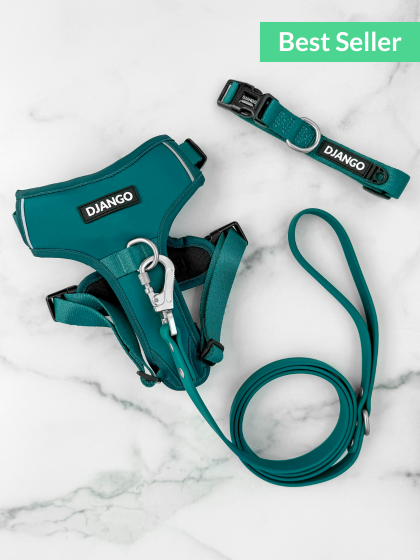Earlier this summer, we received a heartbreaking email from a DJANGO Dog Blog reader (transcript below). Jeanette's dog, Sam, had sadly just passed away from tetanus, a rare but gruesome disease. Jeanette reached out to us to share her dog's traumatic experience with tetanus and asked that we spread awareness and share important information about the disease. In doing so, perhaps we could help prevent another dog's death from tetanus in the future.
If I am being 100% honest, I (Steph) did not know anything about tetanus in dogs before Jeanette reached out. Sure, I had heard of tetanus in humans and received tetanus vaccinations throughout my life...but dogs? I never realized dogs could be susceptible to this disease. After some preliminary research, I realized how important it is for us dog owners to be aware of tetanus in dogs, the disease's symptoms, and how our four-legged friends can contract the disease.
Since receiving Jeanette's heart-wrenching email, I've done extensive research on tetanus in dogs. I also spoke at length with Dr. Shadi Ireifej, the Chief of Medicine at Vet Triage, who helped me further understand risk factors and treatment options for this disease.
Here is everything you need to know about tetanus in dogs: the causes and symptoms of the disease, risk factors, treatment options and costs, side effects, and tips for prevention.
OVERVIEW AND CAUSES OF TETANUS IN DOGS
Tetanus is caused by bacteria called Clostridium tetani (C. tetani). Clostridium tetani are primarily found in dirt, dust, and feces.
When C. tetani bacteria spores enter a dog’s body through a deep wound or open sore, they multiply. As the C. tetani bacteria die, they produce a neurotoxin called tetanospasmin. This neurotoxin binds to the dog's nerves, eventually migrating to the brain and spinal cord. Once this occurs, neurotransmitters that control movement, touch, pressure, temperature, and pain (glycine and GABA) cannot be released. This leads to spasms of voluntary muscles and other symptoms (more on symptoms below).
There are two types of tetanus:
- Localized tetanus is the most common type of tetanus and has a 90 percent survival rate. A dog with localized tetanus may have muscle stiffness or tremors in the limb closest to his wound. In some cases, localized tetanus can develop into generalized tetanus.
- Generalized tetanus occurs when tetanus spreads throughout the dog's body. Generalized tetanus causes the dog to lose his ability to blink. The dog's forehead becomes deeply wrinkled and his ears become pulled back. His eyes bulge, and his lips curl back into a 'sinister smile' known as risus sardonicus. In more advanced stages of generalized tetanus, an affected dog may become so sensitive to sound that any loud noise such as hand clapping can cause seizures or spasms. The dog may not be able to bend his legs, resulting in what is called a 'sawhorse stance'. The dog also may not be able to completely open or close his mouth, and his heart rate may drop below 60 beats per minute. The survival rate for generalized tetanus in dogs is 50 percent.
SYMPTOMS OF TETANUS IN DOGS
Signs and symptoms of tetanus in dogs can appear anywhere from three days to three weeks after the dog is wounded and exposed to C. tetani bacteria. Symptoms can be mild or severe and include:
- Fever
- Constipation
- Drooling
- Wrinkled forehead
- Erect ears
- Sunken eyes
- Unable to blink
- Clenched jaw (lockjaw)
- Smiling appearance (risus sardonicus)
- Stiff and extended tail
- Unbendable legs and an arched back (sawhorse stance)
- Trouble eating or drinking
- Muscle spasms triggered by light, sound, or touch
- Paralysis
- Seizures
- Difficulty breathing
“I think my dog is showing symptoms of tetanus. What should I do?”
If your dog is exhibiting any symptoms of tetanus, please visit your vet as soon as possible. Dr. Shadi Ireifej emphasized that dogs that cannot breathe or move should be immediately rushed to the nearest emergency veterinary clinic.
IS TETANUS COMMON IN DOGS?
Tetanus is fortunately rare in dogs.
Dr. Shadi Ireifej has worked in veterinary medicine for 14 years. He saw one case of canine tetanus at Cornell University in 2004. According to The Canadian Veterinary Journal, horses, humans, and sheep are 600 times more susceptible to tetanus than dogs. Cats and birds are 10 times more resistant to tetanus than dogs.
Some dogs are more at risk of tetanus than other canines. Larger dog breeds that live on farms or in the country have a greater risk of contracting the disease. Dogs that have access to manure or are close proximity to dead animals are also much more at risk of tetanus.
Dogs that spend extensive time outdoors can get tetanus from foxtails, or grass seed awns. If not discovered quickly, these can burrow into your dog’s vital organs and blood vessels. According to the UC Davis School of Veterinary Medicine, 27 percent of canine tetanus cases are caused by foxtail burrs.
Newborn puppies can get tetanus through their umbilical stumps. Dogs under 2 years old are also at greater risk of tetanus because they are more inclined to put dangerous, infected items in their mouth (dirty sticks, rusty nails, glass, etc).
HOW IS CANINE TETANUS DIAGNOSED?
There is no easy diagnostic test for tetanus. Blood tests aren’t accurate because C. tetani does not live long in the air. A tetanus diagnosis is usually made based on your dog’s appearance and the history of his wound. If you did not notice your dog’s wound 10 to 14 days ago, your vet may order a urinalysis, electrocardiogram, and chest X-rays.
TREATMENT OPTIONS FOR TETANUS IN DOGS
- Antibiotics. Penicillin and Metronidazole are antibiotics used to treat tetanus in dogs. They’ve no effect on the neurotoxin but can stop C. tetani from spreading.
- Stabilization. Intravenous (IV) fluids are used to halt dehydration while oxygen is used to prevent respiratory failure. If your dog’s throat and diaphragm are paralyzed, he needs an endotracheal tube or a mechanical ventilator.
- Debridement. Dead tissue is removed from around your dog’s wound to decrease tetanus bacteria. Then it’s cleaned with mild soap and water or iodine.
- Sedation. Acepromazine and chlorpromazine are recommended to control your dog’s sensitivity to light, sound, or touch. He may also be injected with phenobarbital, diazepam, or midazolam to control muscle stiffness.
- Equine antitoxin. A controversial treatment, equine antitoxin may be an option if tetanus is caught early. Made from the blood of horses, it can be given by IV or injected under the skin or into the muscle. It can take up to three days to destroy the tetanus toxin. Skin tests are recommended because equine antitoxin can cause potentially life-threatening allergic reactions.
- Nursing care. Your dog may require around-the-clock care in a dark and quiet room for seven to 30 days. He needs soft bedding, frequent rotation to avoid bedsores, hand feeding or feeding by a G-tube, and help expressing his bladder.
HOW MUCH DOES IT COST TO TREAT TETANUS?
Tetanus treatments can cost anywhere from $15 to $20,000. The cost of treating tetanus in dogs will depend on the severity of the case and required treatment. Mild cases of canine tetanus that only require a vet visit, wound cleaning, and antibiotics may cost up to $200. Severe cases of tetanus requiring long-term sedation, stabilization, and round-the-clock nursing care can cost well into the thousands.
Here is a list of approximate prices for common tetanus treatments. Please keep in mind that costs can vary extensively based on your location and veterinary clinic (we live in NYC so everything costs more here):
- Antibiotics like Penicillin (take by mouth) - $15
- Injectable Penicillin - $250
- Sedation - $85 (small dogs) to $100 (large dogs)
- Bloodwork - $90
- Wound Repair - $135 to $335
- Horse Equine Antitoxin - $3,000
SIDE EFFECTS OF TETANUS IN DOGS
According to the Journal of Internal Veterinary Medicine, 77 percent of dogs that survive tetanus have a REM sleep behavior disorder (RBD). This usually occurs two weeks after dogs are discharged from the vet.
Your dog may twitch, run, or whine in his sleep. While anti-epileptic medications won't help, symptoms should not get worse over time. RBD may resolve after several months.
HOW TO PREVENT TETANUS IN DOGS
Because tetanus is relatively rare in dogs, there is no vaccine currently available for canines like there is for humans.
If your dog has a wound without symptoms, Dr. Ireifej recommends immediately cleaning it with mild soap and water, iodine, or dilute peroxide to rid the site of bacteria and prevent infection. Dr. Ireifej also advises applying Neosporin to your dog’s cleaned wound and bandaging it to prevent the introduction of additional bacteria.
Regardless of how the wound appears, place an e-collar on your dog and visit your vet as soon as possible. Your vet will be able to properly clean the wound further (if required), prescribe any necessary antibiotics, and apply any needed stitches.
Sam's Story
Here is the heartbreaking email we received from Jeanette, a DJANGO Dog Blog reader and dog mom to Sam. Jeanette reached out to us to share her and Sam's heartbreaking experience with tetanus in hopes that we would share information about the disease with our readers.
Sam's Story
May 29, 2020
"Our dog just passed away from tetanus. I’m reaching out to you so that our story can bring awareness to this “rare” disease that seems to affect quite a bit of dogs annually. We first noticed our dog Sam’s face was really weird. It looked like she was locked in a smile (we later found out the name was “the sinister smile”) but very uncomfortable. Upon taking her to a vet they diagnosed her as dehydrated and prescribed antibiotics, lots of water, and rest. But later that day her symptoms seemed to be getting worse and she seemed to be very out of it. We decided that she was behaving in a very alarming and not normal way so we took her to a 24 hr hospital, California veterinary specialists. From there we received the news that our dog had contracted tetanus, a very rare but gruesome disease. So just like any other millennial couple my husband and I began our google research to try and find as much information on this disease as possible. Unfortunately there was little to no helpful information on recovering from tetanus and a lot of really sad photographs of dogs that looked like they were suffering. 2 days later our dogs symptoms got so bad that she was unable to open her mouth (referred to as lockjaw) and was having a very difficult time trying to find a good position so her airways opened up to breathe. The dr in that hospital recommended her staying in the hospital for 2-3 weeks, but possibly over a month, in intensive care in order for them to try and save her. But even then the survival rate they gave us was 30%. We did not have the money to pay for a months stay at a hospital for a 30% chance survival. We could’ve taken her home but without the proper equipment and knowledge to care for her it was very likely that she would suffocate because of the disease and die at home. Our pup was suffering and we made the very difficult and heartbreaking decision to say good bye to her. I want to try to reach out to as many animal blogs as I possibly can to spread awareness and maybe encourage some young vets out there to push for some type of vaccine for tetanus in dogs. Or at least for anyone to do more research for dog owners like us so that we can keep our pups safe."














7 comments
Kathleen
I just lost my lasaopso mix to tetanus I got her fix a week ago
I just lost my lasaopso mix to tetanus I got her fix a week ago
Tony
Hello to all a similar experience with Sam’s story has happened to our little Maltese Dog of 16 years of age. At the age of 13 she was diagnosed with a heart murmur. After extensive research on my part and adopting a holistic approach and reducing her conventional meds her heart murmur and mitral valve regurgitation resolved. If it wasn’t for this dreaded disease she would still be here with us today and doing very well.
Hello to all a similar experience with Sam’s story has happened to our little Maltese Dog of 16 years of age. At the age of 13 she was diagnosed with a heart murmur. After extensive research on my part and adopting a holistic approach and reducing her conventional meds her heart murmur and mitral valve regurgitation resolved. If it wasn’t for this dreaded disease she would still be here with us today and doing very well.
Stephanie Neal
This just happen to our female dog that was spayed a few days earlier. All the symptoms came so quickly. We did find out she got this from the vet office, they didn’t sterilize their instruments they used for surgery and the cleanliness of the operating area was deplorable. Ants on some of the equipment and also a few dead bugs on the table itself. She was our joy each day and the excruciating pain she went through was so sad and hard to get out of our minds. She was diagnosed on Sunday with Tetanus and died Monday at 4 am….it went so fast but so slow at the same time. I was counting the hours that the penicillin may kick in and give her some relief but the symptoms kept coming and muscle spasms were the worst clear until the end. It was on a Sunday in a rural area and my vet wouldn’t answer the phone. I pray no other dogs or humans have to go through this. Tragic.
This just happen to our female dog that was spayed a few days earlier. All the symptoms came so quickly. We did find out she got this from the vet office, they didn’t sterilize their instruments they used for surgery and the cleanliness of the operating area was deplorable. Ants on some of the equipment and also a few dead bugs on the table itself. She was our joy each day and the excruciating pain she went through was so sad and hard to get out of our minds. She was diagnosed on Sunday with Tetanus and died Monday at 4 am….it went so fast but so slow at the same time. I was counting the hours that the penicillin may kick in and give her some relief but the symptoms kept coming and muscle spasms were the worst clear until the end. It was on a Sunday in a rural area and my vet wouldn’t answer the phone. I pray no other dogs or humans have to go through this. Tragic.
DJANGO
@MO I am so sorry to hear about the traumatic passing of your puppy due to tetanus. How heartbreaking. Please know you and your children are in my thoughts. Wishing you and your family the best during this very difficult time. – Steph
@MO I am so sorry to hear about the traumatic passing of your puppy due to tetanus. How heartbreaking. Please know you and your children are in my thoughts. Wishing you and your family the best during this very difficult time. – Steph
Mo
I share a similar experience with Sam’s story. Our puppy just passed yesterday in a very dramatic way due to tetanus. This was the most heartbreaking experience ever for our kids as he was just 7 months, had just returned from the vet and within an hour he passed.
I share a similar experience with Sam’s story. Our puppy just passed yesterday in a very dramatic way due to tetanus. This was the most heartbreaking experience ever for our kids as he was just 7 months, had just returned from the vet and within an hour he passed.
DJANGO
@KRISTINE Thank you so much for the kind comment. I’m so sorry for your family’s recent loss. My heart goes out to you. Thank you so much for letting us know about Sam’s story and helping us bring awareness to this awful disease. I hope this information helps other loving dog families down the road. — Steph
@KRISTINE Thank you so much for the kind comment. I’m so sorry for your family’s recent loss. My heart goes out to you. Thank you so much for letting us know about Sam’s story and helping us bring awareness to this awful disease. I hope this information helps other loving dog families down the road. — Steph
Kristine
Thank you so much for sharing Sam’s story. I am also a member of the family. I thank you for such a informative, researched article. If we can help even just one family save their dog with this awareness, we have done our part.
Thank you again 💝
Thank you so much for sharing Sam’s story. I am also a member of the family. I thank you for such a informative, researched article. If we can help even just one family save their dog with this awareness, we have done our part.
Thank you again 💝